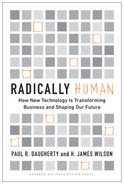PART TWO
COMPETING IN THE RADICALLY HUMAN FUTURE
In part one, we explored the latest developments in intelligence, data, expertise, architecture, and strategy—IDEAS—that farseeing leaders will use to transform their companies. Taken together these turns toward the radically human in technology will remake business. In intelligence, machines are more closely mimicking the way humans reason, feel, and behave. Data on a more human scale is making more agile and more targeted applications possible for more companies; it is also complementing massive data systems to produce unprecedented levels of precision and power. Machine teaching is enabling humans to directly impose their professional, collective, and inherent expertise onto AI-powered applications. More agile and adaptable living IT systems, leveraging the cloud/edge and digital decoupling, are supplanting monolithic legacy systems. None of this is theoretical—some or all of these elements are already at work in strategies like Forever Beta, Minimum Viable IDEA, and Co-lab, with more to come as the technology continues to evolve.
Part two turns to how these new technologies and platforms will drive differentiation in four key areas that will be critical for companies to compete successfully in the radically human future: talent, trust, experiences, and sustainability.
Why these four? Since at least the turn of this century, many companies have sought to differentiate themselves along some or all of these dimensions. That’s not news. What’s new—and what is giving executives pause—is that these issues have taken on an unprecedented degree of urgency. In some cases, intelligent technologies have themselves contributed to that urgency. With trust, for example, AI has created some of the suspicion with which customers and employees alike regard technological innovations. The rise of new technologies has also put pressure on talent. For if, as we’ve argued, all companies are now tech companies, all employees are now tech employees whose skills with intelligent technologies will be major difference makers. These technologies also provide customers and employees with digitally driven experiences that transcend traditional notions of customer experience or employer brand—and threaten to leave purveyors of prosaic experiences far behind. It should be noted, too, that like the technology, these differentiators are themselves radically human. Talent—people—are the most radically human resource of all. Trust is the basis of human bonds, as well as commerce. Memorable experiences point beyond the transactional to the personally transformative. Sustainability speaks to the very survival of the human species.
Many executives are fully aware of the pressures. In our pre-pandemic study respondents reported that in the absence of retraining their employees, 52 percent of their IT workforce’s skills, and nearly half—47 percent—of their non-IT workforce’s skills would be obsolete in three years.1 In chapter 6, we will see how leading companies are responding by putting intelligent technologies in the hands of diverse people at every level, investing in innovative “digital fluency” training, and using technology to achieve productivity anywhere through new ways of combining office and remote work. These companies are redeveloping existing talent, attracting new talent, and refashioning deep-rooted cultures to turn the workforce from passive users of intelligent systems to active producers of such systems, with exponentially more valuable and profitable results.
Trust is similarly taking on renewed urgency. IDC predicts that by 2023, 50 percent of the Forbes Global 2000 will name a chief trust officer, who orchestrates trust across functions including security, finance, HR, risk, sales, production, and legal.2 But trust must also be rethought in light of ubiquitous technologies that tap into deep wells of anxiety about our relationship to them. In chapter 7, we will see what can be done to imbue these technologies with the essentials of trust: humanity, fairness, transparency, privacy, and security. Privacy is now Apple’s foremost differentiator. Goldman Sachs-based startup CYFIRMA is using predictive analytics to detect cyber threats before they become cyberattacks.3 Manhattan-based AI startup Pymetrics is one of a number of tech startups trying to overhaul the hiring process with the help of AI—but in a way that’s free of human bias and genuinely fair to both the jobseeker and the employer. These companies and others, in making trust an integral component of their business model, strategies, and the technology itself, are turning trustworthiness into operational reality.
As we saw in chapter 4 on architecture, technology has now made it possible for companies to provide customers and employees alike with a vast array of new experiences—new experiences of products and services as well as new experiences of work. In chapter 8, we look at the ways leading companies are drawing on IDEAS to design radically human experiences that tap into some of the most compelling human aspirations and interests: (1) empowering experiences that fulfill our need for mastery; (2) rewarding experiences that provide personal growth, fun, or satisfying collaboration; (3) tuned-in experiences that offer effortless engagement; and (4) responsible experiences that connect us with something larger than ourselves. Companies that continue to think of experience merely in terms of customer touchpoints are likely to fall behind in the marketplace and miss the boat entirely in terms of employees.
For a planet under mortal threat, perhaps no issue is more urgent than sustainability. As predictions of climate change have become reality, companies are deploying new technologies to outperform less responsible actors and meet rising expectations of customers, partners, and the wider society. In chapter 9, we will encounter companies in industries, from automobiles to textiles to mining and more, that are putting sustainability front and center, using intelligent technologies and living systems featuring cloud/edge architecture to help them make good on their promises.
In the radically human future of commerce and technology, companies that excel on these key differentiators will separate themselves from the pack. Some already are, as you will find in the pages that follow, and where you will learn how your company can, too.
